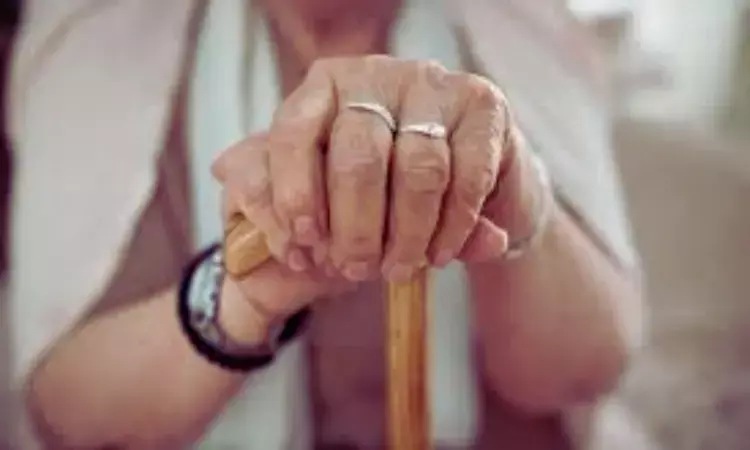- Home
- Medical news & Guidelines
- Anesthesiology
- Cardiology and CTVS
- Critical Care
- Dentistry
- Dermatology
- Diabetes and Endocrinology
- ENT
- Gastroenterology
- Medicine
- Nephrology
- Neurology
- Obstretics-Gynaecology
- Oncology
- Ophthalmology
- Orthopaedics
- Pediatrics-Neonatology
- Psychiatry
- Pulmonology
- Radiology
- Surgery
- Urology
- Laboratory Medicine
- Diet
- Nursing
- Paramedical
- Physiotherapy
- Health news
- Fact Check
- Bone Health Fact Check
- Brain Health Fact Check
- Cancer Related Fact Check
- Child Care Fact Check
- Dental and oral health fact check
- Diabetes and metabolic health fact check
- Diet and Nutrition Fact Check
- Eye and ENT Care Fact Check
- Fitness fact check
- Gut health fact check
- Heart health fact check
- Kidney health fact check
- Medical education fact check
- Men's health fact check
- Respiratory fact check
- Skin and hair care fact check
- Vaccine and Immunization fact check
- Women's health fact check
- AYUSH
- State News
- Andaman and Nicobar Islands
- Andhra Pradesh
- Arunachal Pradesh
- Assam
- Bihar
- Chandigarh
- Chattisgarh
- Dadra and Nagar Haveli
- Daman and Diu
- Delhi
- Goa
- Gujarat
- Haryana
- Himachal Pradesh
- Jammu & Kashmir
- Jharkhand
- Karnataka
- Kerala
- Ladakh
- Lakshadweep
- Madhya Pradesh
- Maharashtra
- Manipur
- Meghalaya
- Mizoram
- Nagaland
- Odisha
- Puducherry
- Punjab
- Rajasthan
- Sikkim
- Tamil Nadu
- Telangana
- Tripura
- Uttar Pradesh
- Uttrakhand
- West Bengal
- Medical Education
- Industry
Mediterranean Diet with Exercise Improves Bone Health in Older Women with Metabolic Syndrome: JAMA

Spain: In a secondary analysis of a randomized clinical trial, researchers found that older women with metabolic syndrome experienced improved bone mineral density (BMD), particularly in the lumbar spine, when following a modest hypocaloric Mediterranean diet combined with physical activity. These benefits were more significant than those seen with a non-restrictive Mediterranean diet alone over 3 years.
The findings were published online in JAMA Network Open on April 8, 2025.
Understanding how diet and physical activity influence bone health is crucial, particularly in older adults, where age and intentional weight loss can contribute to bone deterioration. With this in mind, Héctor Vázquez-Lorente, Institut d’Investigació Sanitària Pere Virgili, Reus, Spain, and colleagues aimed to evaluate the impact of a weight-loss lifestyle intervention on key bone health indicators—bone mineral density (BMD), bone mineral content (BMC), and the prevalence of low BMD. By examining whether structured changes in diet and physical activity could help preserve bone strength, the study sought to identify strategies that not only support healthy aging but also minimize the risk of osteoporosis and related fractures.
For this purpose, the researchers conducted a 3-year randomized clinical trial as part of the PREDIMED-Plus study in Spain, involving adults aged 55 to 75 years with metabolic syndrome and overweight or obesity. Participants from four centers with access to DXA scans were included in this secondary analysis. They were randomly assigned to either an intervention group, which followed an energy-reduced Mediterranean diet and increased physical activity, or a control group that received general advice to follow a Mediterranean diet without calorie restriction or activity goals. Bone mineral density and content were measured at baseline, 1 year, and 3 years using DXA.
The key findings were as follows:
- The study included 924 older adults with a mean age of 65.1 years; 49.1% were women, and 50.9% were men.
- After 3 years, the intervention group showed a greater increase in lumbar spine (L1-L4) BMD compared to the control group, with a between-group difference of 0.9 g/cm².
- At the 1-year mark, the difference in lumbar spine BMD was not significant (−0.1 g/cm²).
- The protective effect of the intervention was seen in women, showing a BMD increase of 1.8 g/cm² over 3 years.
- No significant effect was observed among men.
- The intervention had no significant impact on total bone mineral content (BMC) or the prevalence of low BMD over 3 years.
“These findings indicate that a weight-loss lifestyle intervention combining an energy-reduced Mediterranean diet with physical activity may help slow down age-related bone mineral density decline, particularly in older women with metabolic syndrome,” the authors wrote. They added that, compared to general dietary advice, the structured approach demonstrated greater benefits—especially at the lumbar spine—over three years.
Given the high risk of osteoporosis and fractures in aging women with excess weight, the authors emphasized that this strategy appears both feasible and clinically relevant.
“Longer-term studies are needed to confirm these results and assess their potential role in preventing bone-related complications in older adults,” they concluded.
Reference:
Vázquez-Lorente H, García-Gavilán JF, Shyam S, et al. Mediterranean Diet, Physical Activity, and Bone Health in Older Adults: A Secondary Analysis of a Randomized Clinical Trial. JAMA Netw Open. 2025;8(4):e253710. doi:10.1001/jamanetworkopen.2025.3710
Dr Kamal Kant Kohli-MBBS, DTCD- a chest specialist with more than 30 years of practice and a flair for writing clinical articles, Dr Kamal Kant Kohli joined Medical Dialogues as a Chief Editor of Medical News. Besides writing articles, as an editor, he proofreads and verifies all the medical content published on Medical Dialogues including those coming from journals, studies,medical conferences,guidelines etc. Email: drkohli@medicaldialogues.in. Contact no. 011-43720751


